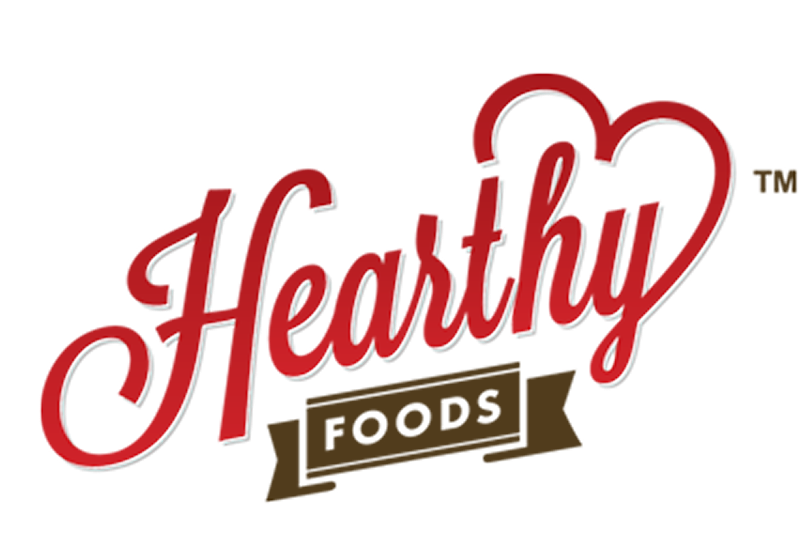News
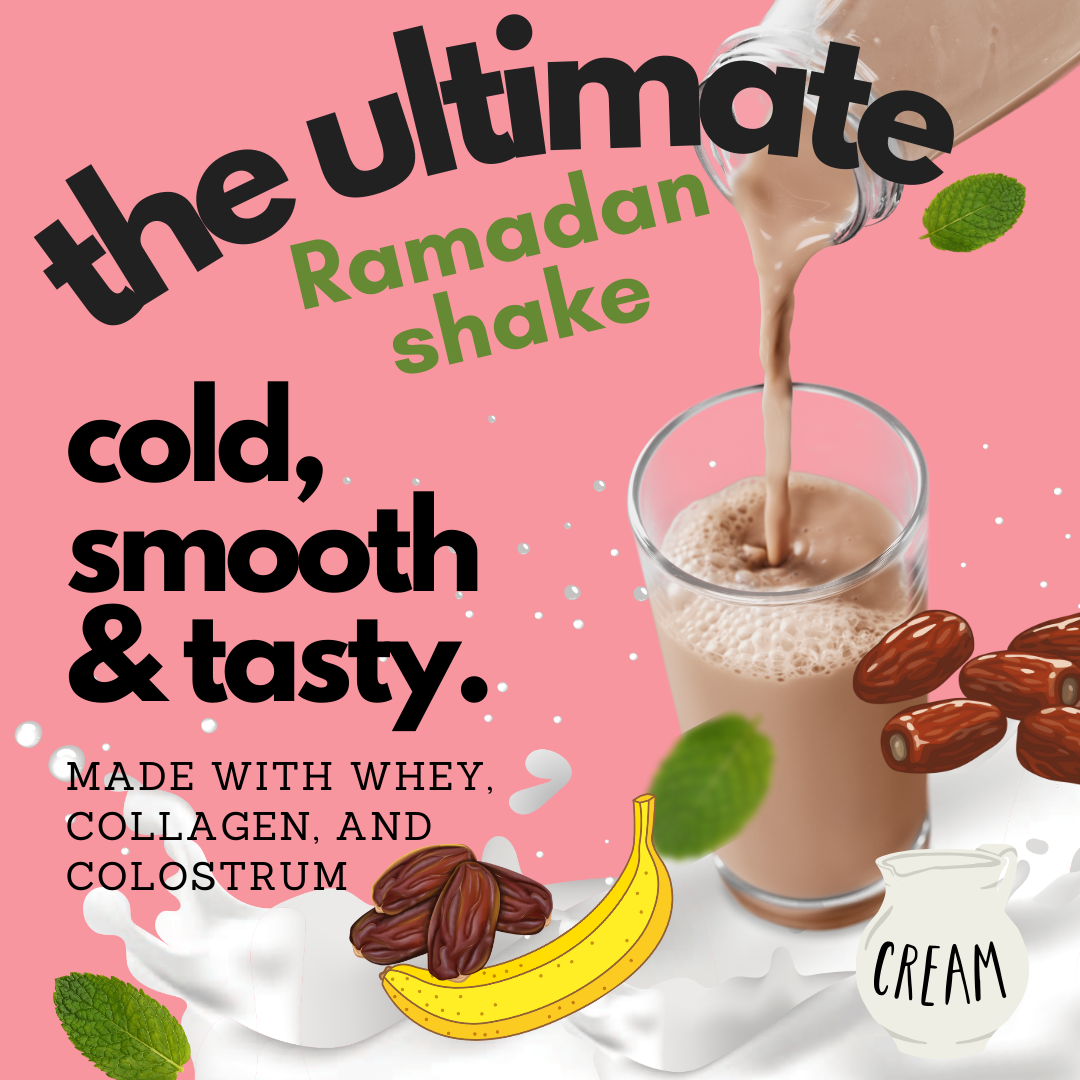
MAR 06, 2024
Ramadan Diet Plan: Get into the Best Shape of your Life!
Traditionally, the Ramadan diet focuses on nutritious, light, and hydrating foods that provide energy and sustenance throughout the day. Some common good foods eaten during Ramadan include: Dates, banana, whey protein, water, honey, collagen, colostrum, and milk It's also important to stay hydrated by drinking plenty of water and avoiding caffeine and sugary drinks. The Ramadan diet is not just about abstaining from food and drink, but also about cultivating self-discipline, empathy for those in need, and a stronger connection to one's faith. Get in the best shape of your life by eating lots of protein, drinking water, and not over eating, avoiding sugar and fried foods.
READ MORE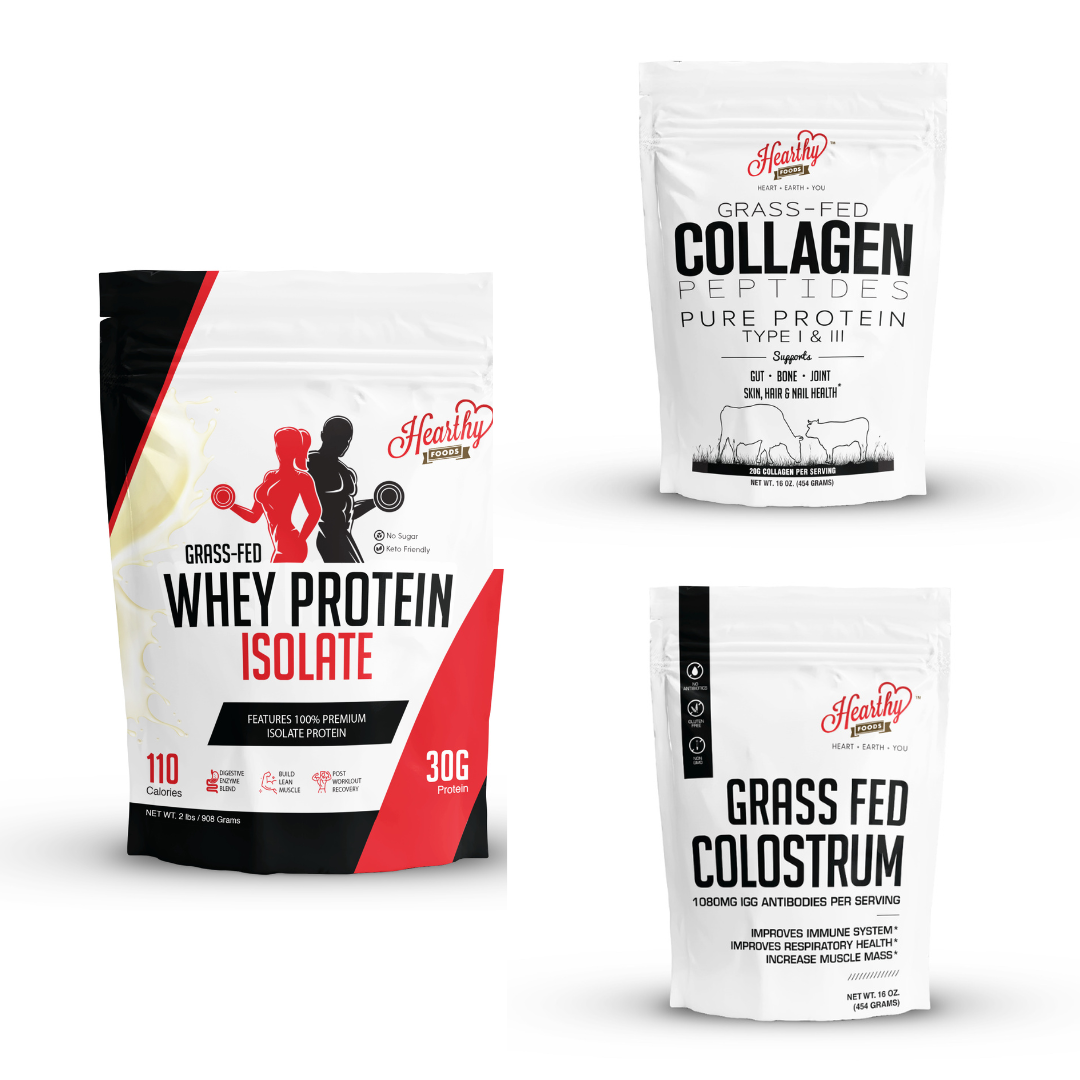
OCT 19, 2023
Unleashing the Power of the Ultimate Protein Shake
Protein shakes have long been associated with athletes and fitness enthusiasts, and for good reason. They offer a convenient and effective way to meet protein needs, especially after an intense workout. However, not all protein shakes are created equal. Allow us to introduce you to the ultimate protein shake, a powerhouse blend of quality proteins and nutrients designed to optimize muscle growth and recovery. 50 Grams of Quality Protein Our ultimate protein shake isn't just a run-of-the-mill protein supplement. It's a meticulously crafted blend of two high-quality protein sources: whey and collagen. Each serving of this shake delivers a whopping 50 grams of protein - 30 grams from whey and 20 grams from collagen. Why these two sources, you may ask? Whey protein is a complete protein that contains all nine essential amino acids. It’s easily digestible and quickly absorbed by the body, making it an excellent choice for post-workout recovery. On the other hand, collagen protein, while not a complete protein, offers unique benefits. It's great for joint health, skin health, and can even aid in digestion. The combination of these two proteins ensures that you're not just building muscle, but also taking care of your overall health. Google "Dr. Berg Colostrum video for the benefits of colostrum" Colostrum for Muscle Growth and Recovery But the benefits of our ultimate protein shake don't stop at high-quality proteins. We've also added colostrum to the mix. Colostrum is a form of milk produced by mammals in the late stages of pregnancy and the first few days after giving birth. Packed with nutrients, antibodies, and growth factors, it's often referred to as 'liquid gold'. In the context of fitness and muscle building, colostrum is especially beneficial due to its growth factors. These growth factors can help to stimulate muscle growth, improve recovery, and enhance performance. Incorporating colostrum into your post-workout shake can give you that extra edge you're looking for in your fitness journey. The Ultimate Protein Shake: More Than Just a Protein Supplement With its blend of whey and collagen proteins, and the addition of colostrum, our ultimate protein shake is more than just a protein supplement. It's a comprehensive post-workout solution designed to support muscle growth, recovery, and overall health. Whether you're a seasoned athlete or just starting your fitness journey, incorporating this ultimate protein shake into your routine can help you get the most out of your workouts and speed up your progress.
READ MORE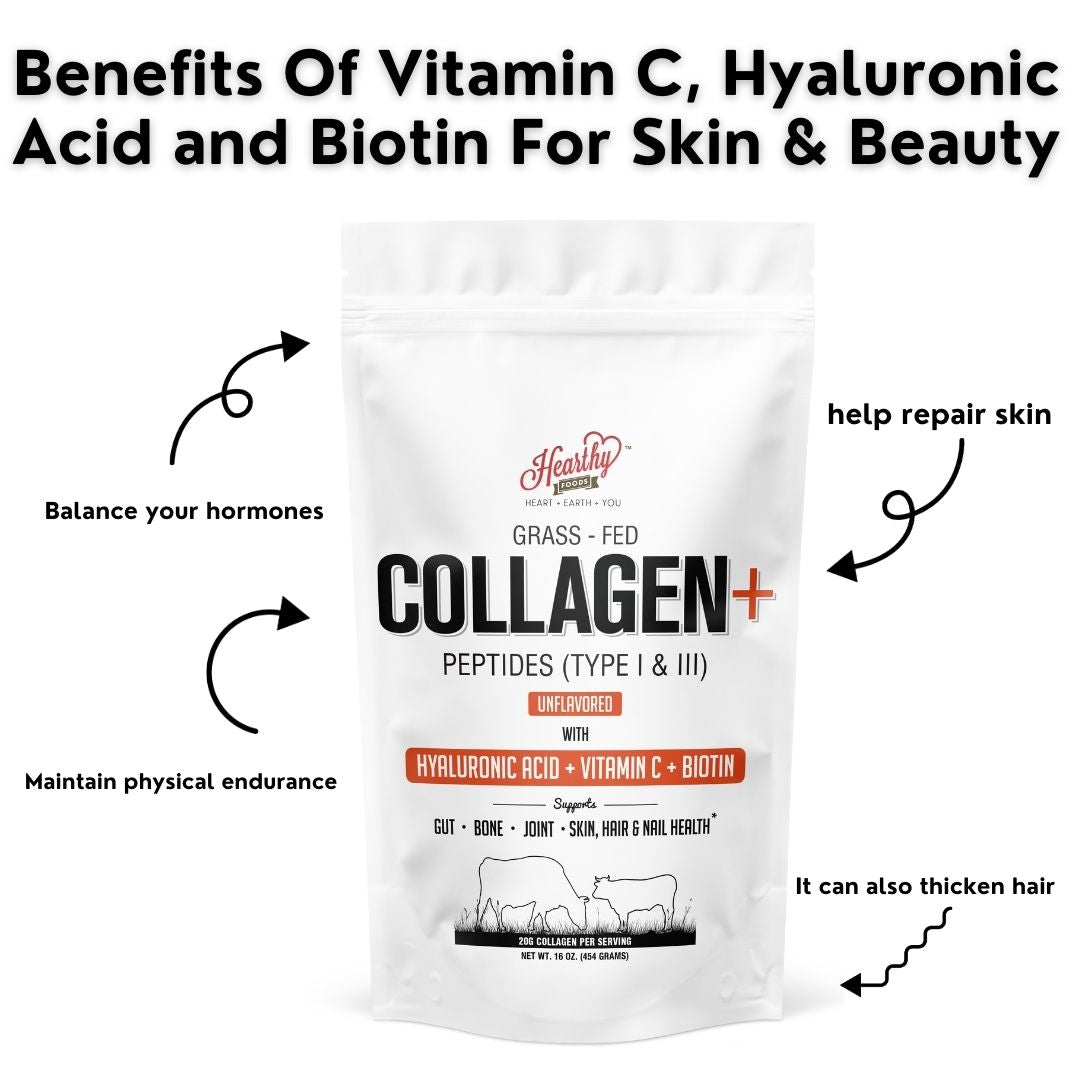
OCT 10, 2023
The Amazing Benefits Of Vitamin C, Hyaluronic Acid, and Biotin For Skin Beauty
The Power of Vitamin C Vitamin C is a potent antioxidant that can neutralize free radicals in the skin. Its antioxidant properties help to strengthen the skin's natural defenses against damaging environmental factors like pollution and UV exposure. Due to its high acidity, when applied topically, the skin is triggered to heal itself by accelerating the production of collagen and elastin. Both collagen and elastin are naturally occurring protein fibers that help keep skin plump and firm. So, a topical application of Vitamin C can help to prevent premature aging of the skin. The Magic of Hyaluronic Acid Hyaluronic Acid, also known as HA, is a naturally occurring substance in our skin that holds water, keeping it hydrated and plump. It holds a thousand times its weight in water to not only retain all that moisture in our skin and joints, but also prevent all that moisture from evaporating into the air. Hyaluronic Acid has a unique capacity to bind and retain water molecules, making it critical for maintaining skin hydration. The result is a visible smoothing and plumping effect that can minimize the appearance of fine lines and wrinkles. The Brilliance of Biotin Biotin, also known as vitamin B7, is a water-soluble vitamin that plays a vital role in the health of our hair, skin, and nails. Biotin's main function is to support the health of our cells. It's involved in a number of processes within the body, including the metabolism of carbohydrates, fats, and proteins. When it comes to our hair, skin, and nails, Biotin can improve the infrastructure of keratin, the main protein these structures are made of. This means that Biotin can help promote stronger and healthier hair, skin, and nails. In addition to these benefits, Biotin also helps balance hormones and maintain physical endurance. Balanced hormones can lead to healthier skin, and physical endurance can keep you active and energetic, which also contributes to overall skin health. The Combined Benefits When combined, the benefits of Vitamin C, Hyaluronic Acid, and Biotin create a powerful skincare routine. Vitamin C provides antioxidant protection, combating free radicals that can cause skin damage. Hyaluronic Acid provides hydration, maintaining moisture levels in the skin to keep it plump and youthful. Biotin, on the other hand, provides strength, improving the infrastructure of keratin for healthier skin, hair, and nails. Overall, these three ingredients can work together to repair skin, thicken hair, balance hormones, and maintain physical endurance. They can be a great addition to your skincare routine, resulting in more radiant, healthier, and youthful-looking skin.
READ MORE
APR 10, 2023
Dr Berg Recommends Grass Fed Hearthy Colostrum
Dr. Berg is a popular health and wellness expert who has a website and YouTube channel where he provides information on various health topics, including nutrition, weight loss, and natural remedies. Colostrum is a type of milk produced by mammals in the first few days after giving birth. It is rich in nutrients and antibodies that help the newborn develop a strong immune system. Dr. Berg has spoken about the potential benefits of Hearthy Grass Fed Colostrum supplementation for adults, including improved immune function, better gut health, and increased athletic performance. He suggests that colostrum may be particularly beneficial for those with weakened immune systems or digestive issues. Colostrum is a nutrient-rich substance that is produced by mammals in the first few days after giving birth. It is rich in nutrients and bioactive compounds that help newborns develop a strong immune system and grow. While research on the benefits of colostrum supplementation for adults is still limited, some potential benefits include: Improved immune function: Colostrum contains antibodies, growth factors, and other immune-boosting compounds that may help improve the function of the immune system. It may help reduce the risk of infections and boost the body's ability to fight off pathogens. Better gut health: Colostrum contains lactoferrin and other bioactive compounds that may help improve gut health. It may help reduce inflammation, improve gut barrier function, and reduce the risk of gut-related conditions. Increased athletic performance: Colostrum may help improve exercise performance by increasing muscle strength, endurance, and reducing muscle damage. It contains growth factors that help repair and regenerate muscle tissue. Anti-aging effects: Colostrum contains antioxidants and other compounds that may help reduce oxidative stress and slow down the aging process. Improved wound healing: Colostrum contains growth factors that may help improve wound healing by promoting the growth of new tissue and reducing inflammation.
READ MORE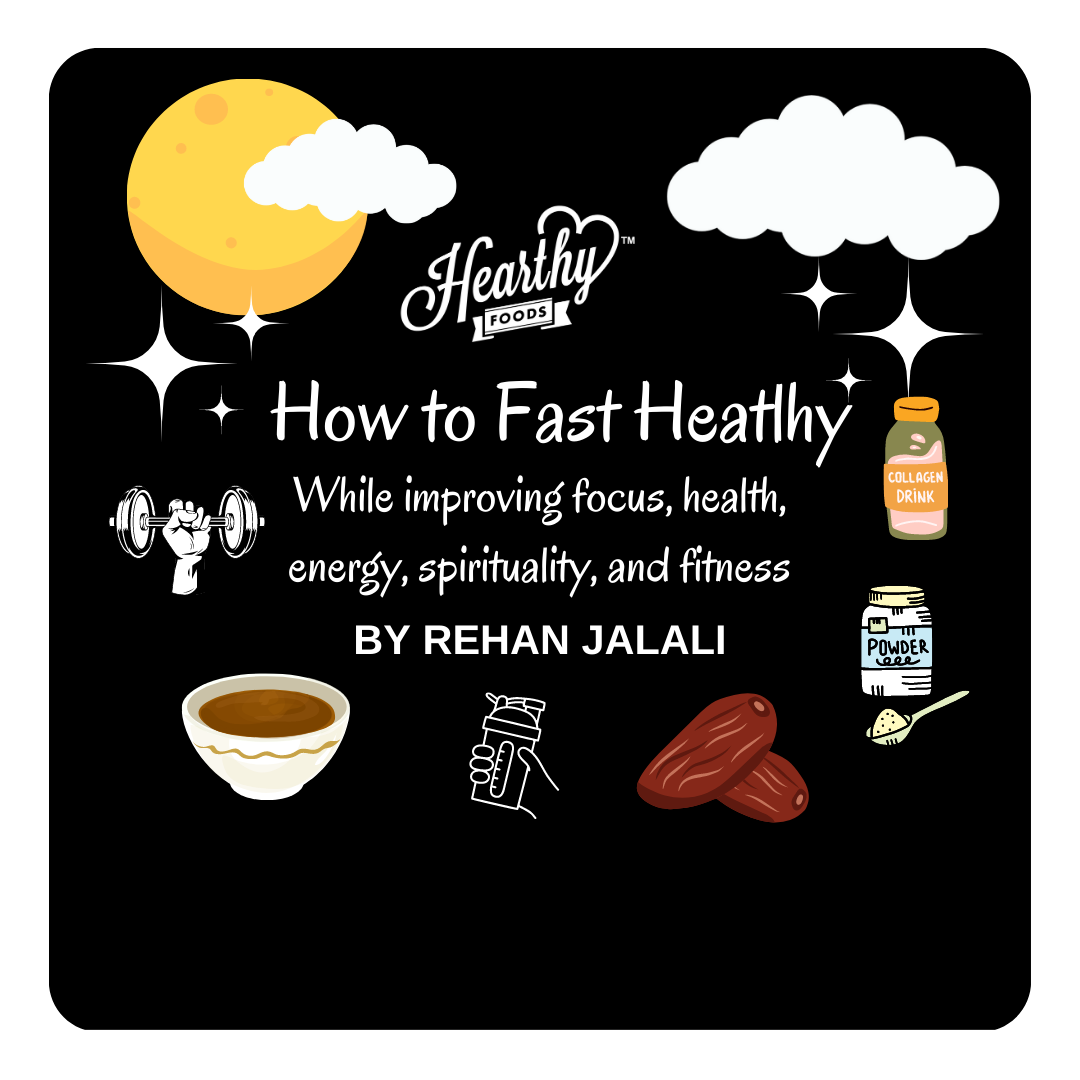
MAR 23, 2023
How to Fast Healthy While Improving Focus, Health, Energy, Spirituality, and Fitness
By: Rehan Jalali, C.S.N. Due to the Intermittent fasting movement, many people have incorporated regular fasting into their lives. The 16:8 eating plan and others are very popular these days. Well, Ramadan is the Michael Jordan of fasting! Most people see the month of Ramadan as a time when they will surely lose strength and or muscle mass and some people think they can only “maintain” during this month. This cannot be further from the truth. In fact, if you use some of the strategies I am about to share with you, you can make some of your best gains during this month! It’s all about maximizing nutrient uptake/Lowering any chance of deficiencies, maintaining proper hydration, boosting immune function, maximizing sleep, and modifying key fat burning/muscle building hormones in your favor during this month. And of course PREPARATION—If you fail to plan, then you plan to fail! Plus, how can you truly maximize this month spiritually and get in the zen zone if your body is sick, tired, and your mind isn’t sharp? Make sure you set specific fitness goals for Ramadan, write them down and put on your fridge or phone, and go and achieve them! This year the fasting will be strenuous--around 13-15 hours a day. More if you happen to live in the UK or parts of Europe. So you must be more vigilant about hydration and the food you eat. First of all, let’s look at what happens to your body during Ramadan. While you are fasting, obviously you become more dehydrated at rest--but actually less than if you had exercised aerobically for over an hour (so exercise causes greater dehydration for that time period versus fasting). Your main metabolic fuel source for bodily function during fasting is mainly fat, which is a good thing (semi ketosis state). So the goals during Ramadan are to maximize metabolism (even though your metabolism may slow down due to less food and little sleep), preserve and enhance as much lean muscle mass as possible (which will inherently increase metabolic rate and allow you to burn more calories at rest), and maximize your workout (both cardio and weight training). During Ramadan, depending on your goals, I really recommend that you limit cardio to 1-3 days a week at the most. This is again to preserve as much lean muscle tissue as possible. There is actually research showing the health benefits of fasting. It is truly a physical purification. According to a study published in the reputable European Journal of Clinical Nutrition, the researchers concluded that “no detrimental effects on health have as yet been directly attributed to negative water balance at the levels that may be produced in Ramadan.” Other research has actually shown cardiovascular benefits of fasting during Ramadan—that is if you can avoid the IBS (no, not irritable bowel syndrome) but the dreaded Iftar Binging Syndrome! It is vital to eat moderate to small meals even after iftar (breaking the fast). Studies show Ramadan fasting lowers blood pressure, lowers inflammation, improves cardiovascular health, and causes enhancements in platelet count. Plus fasting is now showing immune system rejuvenation and stem cell regeneration! And numerous brain health benefits. Training Times Ok, enough of the background, let’s get to the meat of it! I am going to set the record straight here. The best time to do a weight training workout is NOT while fasting. This can create way too much muscle breakdown and cause a significant rise in the catabolic hormone cortisol. Training while in a state of dehydration can decrease strength significantly. In fact, research indicates that dehydrating a muscle by as little as 3% can cause a 12% loss in strength. Training while you are fasting can actually be much more detrimental than beneficial! This is mainly due to no water intake. If it was just food and you were hydrated, no prob. The best time to weight train during Ramadan is at night. This will insure that you will have several meals and plenty of water in your system before going to the gym. This will also allow you to consume your important post workout meal or shake which is essential to muscle growth and even fat loss. If this is too late then the next best time to weight train is about 1 hour after Breaking the fast. You could do a short but intense 20-30 minute workout. In fact, research shows that a reduced training volume during Ramadan can maximize lean muscle and strength. The best time to do cardio work for maximum fat loss is before the pre-dawn meal—yep that’s the truth. Of course, most people I know will not want to get up at around 3: 30 AM and do cardio! If you CAN pull this off then the best thing to do is get up and drink plenty of water with a cup of coffee, green tea, or oolong tea and perform 6-9 minutes of high intensity cardio work like sprinting. Stretch before and after the session. If this is out of the question for you, then the next best time to do cardio is approximately 30-45 minutes before breaking of the fast (Brisk walk or steady state cardio only during this time). Short, high intensity cardio like sprinting is actually great to do during Ramadan. It takes less than 10 minutes and provides maximum benefit in terms of fat burning and lean muscle preservation! This isn’t “driving miss Daisy” cardio—it’s very intensive-Ex. Sprint for 15-20 sec at full speed (like a dog or the police is chasing you!) and walk for 1 min. Do 5-6 cycles like that and you’re good! Start slow of course and work your way up. This high intensity cardio should not be done while fasting but rather after breaking the fast or before the pre-dawn meal. According to some research, rinsing the mouth with water or a carbohydrate solution during the fast while exercising can improve sports performance! So rinse away! So now you know when to train, it’s time to learn what to eat and drink (think water, water, and more water!). Suhur meal (Morning/pre-dawn) For the pre-dawn meal, it is imperative to drink plenty of water and eat a good blend of protein, carbohydrates, fiber, and essential fat—that’s right “good fats” have many fat loss, health, and muscle building properties and their importance is even greater during Ramadan. Nutrient dense is the key here! Some good “suhur” foods include: Egg whites (1-2 yolks) Chicken breast Oatmeal (preferably steel cut or multi-grain) Cream of wheat Hearthy Protein shake Heathy Collagen Hearthy Bone Broth Trader Joe's Granola bars Cinnamon Bananas Raw, Dark Honey Raisins or dates Watermelon Figs Fibrous vegetables –This will help increase the feeling of fullness as well. All natural peanut butter or almond butter Hemp/flax/chia seeds Flax seed and fish oil - A great and tasty brand is Omega Swirl from Barleans and Country Life or NOW foods has a high DHA fish oil which would be good for mental function. Olive oil – preferably extra virgin (which means it’s cold processed and the essential fatty acids are preserved) It is important to take a solid Hearthy Multi-Vitamin/multi-mineral supplement with the pre-dawn meal (suhur) as well to make sure daily minimum requirements of key nutrients are met. The best one is Advanced Multivitamin from Hearthy Foods. Taking extra vitamin C can also be helpful. A great product is Emergen-C from Alacer. It is very important to watch your sodium intake at this time as high sodium can cause greater dehydration plus increase thirst during the day—not good for fasters. Avoid high sodium foods like soups, sauces, condiments, gravies, high sodium bread products, and canned meats. Of course eating fried foods and heavy oil items can cause heartburn and problems for you all day so it is best to avoid those if possible! Iftar meal (Sunset time to Break the Fast) This is a key time for rehydration. Breaking the fast with dates and water is profound nutritionally, you will see that dates are very unique in their nutrient content. They contain very high levels of potassium (much more than a banana), a key re-hydration mineral and a special carbohydrate blend that enhances hydration above and beyond water alone. They contain a special blend of glucose and fructose for short and long term energy. They also have a special nutrient called beta D-glucan which is a soluble fiber that can enhance satiety and digestive health. So basically when you eat a date and water for iftar your body gets hydrated again much faster than with water alone (this is a complex topic but I don’t want to bore you with the details—You can think of dates and water as a very advanced form of Gatorade®). In fact, clinical research published in the International Journal of Food Science and Nutrition entitled “The fruit of the date palm: its possible use as the best food for the future?” concluded that “dates may be considered as an almost ideal food, providing a wide range of essential nutrients and potential health benefits.” You should also eat some quality protein at iftar time as well. I recommend three dates and a protein powder like Hearthy Whey Protein. Of course, drink plenty of water--In fact, keep a water bottle with you at all times after sunset! Then 1- 1.5 hours later have a food meal (or follow the schedule above for cardio). Then during prayer have a protein bar or ready to drink protein shake in the middle (not while you are praying of course!) or have another small protein and complex carbohydrate meal after the 8—drink plenty of water if you have a protein bar (Quest, Barbells, or Power Crunch if you want a lighter version). Then go train about 30-45 minutes after eating the bar (bar is optional). A great pre-workout drink like Pre-Kaged from Kaged Muscle, C4, or Bang energy can be beneficial for energy and strength levels. Keep in mind the Bang and Pre-Kaged have significant amounts of caffeine so if you have trouble sleeping, you might just want to stick with a good ole cup of black coffee pre-workout. You can also take an essential amino acid product like EAA+ from Nutrex during and right after the workout to preserve lean muscle. After the workout, also have another nutrition shake (as mentioned a few lines ago) with plenty of water. Don't overeat meals at night. Your body loves homeostasis and wants to maintain a certain balance—you literally have to shock it constantly to lose fat and gain muscle over the long run! There is so much wisdom in “Eat and drink but not to excess"! SAMPLE Ramadan MEAL PLAN for fat loss and muscle gain (*This plan is for a 170 lb male, please adjust amounts for bodyweight) Suhur (Pre-Dawn Meal) Eat 6-8 egg whites (one yolk) One bowl of plain oatmeal w/ cinnamon, raisins and 3 dates 1 teaspoon all-natural peanut butter, almond butter, or olive oil or flax seed oil (1 tablespoon Barleans Omega Swirl) Plenty of water (16-24 oz.) Hearthy Foods Advanced multi-vitamin Turmeric (Hearthy Foods brand) Iftar (the evening opening of the fast): 3-5 Dates and a Hearthy Protein Shake Plenty of water For cardio workouts --Do cardio 30-45 minutes after this meal for 30-45 minutes at a moderate pace or do a sprint workout if you have less time and then have the next meal before night prayers. (Have a cup of green tea, Oolong tea, or coffee with Iftar on cardio days) For weight training days: Eat another food meal before prayers like chicken breast (or lean beef -sirloin/top round/eye of round), brown rice and some veggies OR Baked Fish (Salmon, Tuna, Orange Roughy, cod, or Mahi mahi), sweet potato, and some steamed vegetables. Drink plenty of water during the workout and can take the EAA drinks during. Train intensely and short. Workouts should last 20-35 min. After the workout, have another Nutrition Shake --lots of water of course. Then sleep 45 minutes later or stay up all night eating, praying, and working! Following these simple workout and nutrition tips can really help you make great gains. God Bless! Top 6 healthy foods for Ramadan. 1) Dates – They contain a unique blend of glucose and fructose and have a very high potassium content (about 64% more than bananas). They have a nutrient called beta-D-glucan which is a soluble fiber that has health benefits and can increase the feeling of fullness. 2) Raw, Unfiltered Honey - It contains many phytochemicals and flavanoids that can enhance health. Honey is very good for increasing energy. It is an excellent source of antioxidants. In fact, ORAC tests show it has the highest level of antioxidants of virtually any natural food on earth! It even has anti-bacterial effects. Take 1-2 tablespoons daily. 3) Fish – Eating fish regularly can have positive effects on health. The fish oils EPA and DHA have been shown to improve brain function, enhance cardiovascular health, and reduce inflammation among other things. Some of the best fish are cold water wild salmon, orange or white roughy, deep sea black Cod, sea bass, Ahi Tuna, Mahi mahi, low sodium albacore tuna, and herring. 4) Figs – They contain key mineral such as calcium, iron, magnesium, and potassium. They are also a great source of fiber and can support healthy blood sugar levels. Figs are an alkaline food which means they help balance the Ph of the body making it less acidic. 5) Olive Oil - Contains omega 9 or oleic fatty acids. It has been shown to increase the good cholesterol (HDL) while lowering bad cholesterol (LDL). It also seems to have some antioxidant effects. Look for extra virgin olive oil (cold-pressed). Cooking with it can lower some of its benefits. Add it to food after it is cooked! 6) Watermelon - 92% water and very hydrating. Also contains Citrulline, lycopene, and minerals for health and fitness. *This article is for informational purposes only.
READ MORE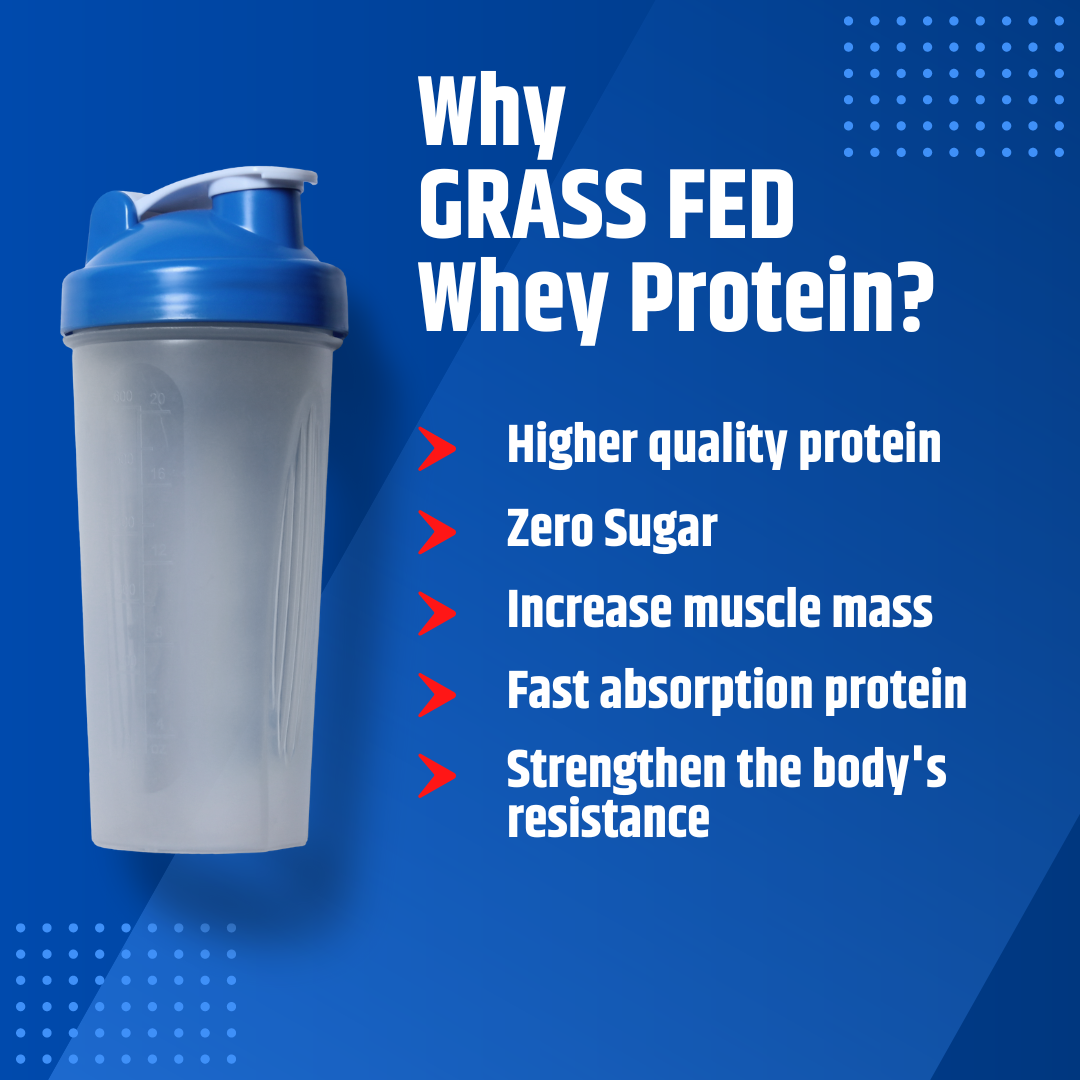
FEB 27, 2023
Grass-Fed Whey Protein With No Sugar: Benefits and Considerations
While it's been said that the role that protein plays in overall health has become somewhat overstated in recent years, it's unarguably still a vital component of a healthy, well-balanced diet. Protein is a nutrient that is vital to our optimal health and can be found in virtually every part of the body, including our bones, muscle, skin, and hair. Protein supports our body's production of enzymes and hormones, and is also essential for building and repairing healthy muscle tissue. According to research published by the National Library of Medicine, the Recommended Dietary Allowance (RDA) for a healthy adult with minimal physical activity is approximately 0.8 grams of protein per kg of body weight daily. Grass-fed whey is an excellent source of high-quality protein that offers many health benefits. Many whey protein products on the market do contain added sugar, but there are also plenty of unsweetened grass-fed whey protein options to choose from; it might just be a matter of carefully reading the labels before making your purchase. For those who prefer a little sweetener, there are also a range of options that contain only a pinch of organic sugar and/or stevia leaf extract, and these can be great choices for kids who need a little extra protein in their diet. Enticing flavors, such as vanilla ice cream protein powder, can be helpful for parents with fussy eaters, too. Why grass-fed? The difference between grass-fed and non-grass-fed whey protein lies in the milk source it's derived from. Grass-fed whey protein comes from cows that have been fed a diet consisting primarily of grass (and other forage), while non-grass-fed whey protein comes from the milk of cows that have been fed a diet high in grains and other supplementary foods. This difference can affect the protein's nutritional content, with grass-fed whey typically containing more omega-3 fatty acids than non-grass-fed alternatives Omega-3 fatty acids are essential nutrients that boast significant anti-inflammatory properties. Grass-fed whey protein also tends to contain higher levels of other key vitamins and minerals, such as vitamin E and beta-carotene. The downside is that grass-fed products are typically more expensive, but as with most things, you get what you pay for in terms of quality. Benefits of zero-sugar, grass-fed whey protein Grass-fed whey protein with no added sugar provides a range of considerable health benefits, including: High-quality source of protein Grass-fed whey protein is a fantastic source of high-quality protein, which is essential in assisting the body to build and maintain muscle mass, as well as supporting overall health and well-being. Whey protein is one of the most bioavailable forms of protein, meaning that it is easy for our bodies to absorb and utilize it. Grass-fed whey protein is also rich in branched-chain amino acids (BCAAs), which are essential for the growth and repair of our muscles. Promotes healthy weight loss So long as they contain no added sugar, grass-fed whey protein products can significantly help to promote healthy weight loss. Protein is an excellent food source for helping us to feel satiated, thus reducing our appetite and food cravings, and preventing over (or unnecessary) eating. Additionally, grass-fed whey protein can help to boost metabolism, as well as increase the amount of calories burned during exercise. Research has shown that consuming whey protein regularly can result in weight loss and a reduction in overall body fat. Supports cardiovascular health Studies show that whey protein can help to lower blood pressure and cholesterol levels, both of which are significant risk factors for heart disease. In addition, whey protein has been shown to have anti-inflammatory effects, helping to further reduce the risk of developing heart disease and a range of other chronic conditions. Enhances immune system function Whey protein is rich in immunoglobulins and lactoferrin, both of which are known to support the healthy function of our immune system, and assist in fighting off infections and disease. Furthermore, whey protein helps to stimulate the production of glutathione, an antioxidant that plays a key role in healthy immune function. Packed with essential nutrients Grass-fed whey protein can provide many essential nutrients that our bodies need for optimal health. Whey protein is high in many vitamins and minerals, such as calcium, magnesium, and phosphorus. These nutrients play a vital role in maintaining strong teeth and bones, as well as supporting a range of other bodily functions. Considerations when buying grass-fed whey protein While there are many benefits to sugar-free grass-fed whey protein, there are some considerations to bear in mind when selecting which product is best for you. Quality When selecting a grass-fed whey protein product, look for high-quality ingredients. While it's great that the whey has been sourced from grass-fed cows, products with no other added artificial ingredients will be a far healthier option. Higher-quality protein products will likely be a little more expensive, but it will be worth the investment for optimal health. Consider the Source For peace of mind all round, go for products that are made from milk that has been sourced from reputable places, such as local, small family farms, as they are more likely to prioritize the well-being of their animals. This will help to ensure that the cows have been treated humanely and that the milk itself is free from harmful chemicals and other contaminants. Protein content When selecting any protein supplement, it's important to check the protein content to ensure that it will provide you with enough protein to gain the health benefits you're after. Products with at least 20 grams of protein per serving are best. Allergies and Sensitivities Anyone with an allergy or intolerance to lactose (or dairy in general) should be cautious when it comes to consuming grass-fed whey protein products. Some products have been treated to remove the lactose, and this will typically be clearly advertised so look out for those options. Some individuals may be allergic to whey protein itself, so it might be best to consult with a healthcare provider before starting on any new supplements. Final Thoughts Zero-sugar, grass-fed whey protein is a great option for those looking to supplement their diet with high-quality protein without the added sugars or other nasties that are commonly found in protein supplements. It's also an excellent addition to any diet with weight loss as a primary goal.
READ MORE